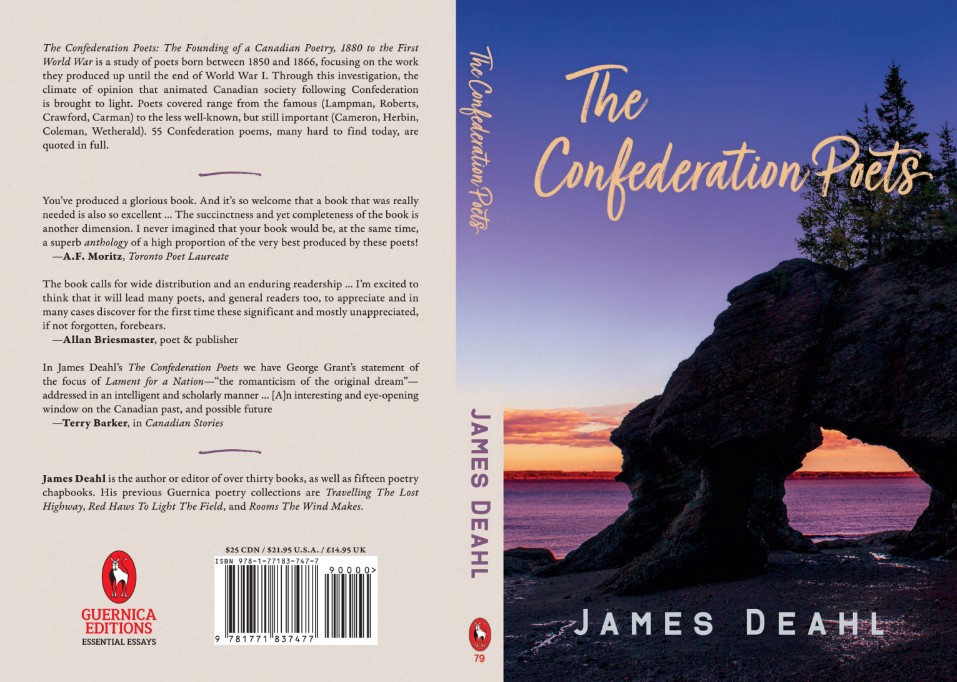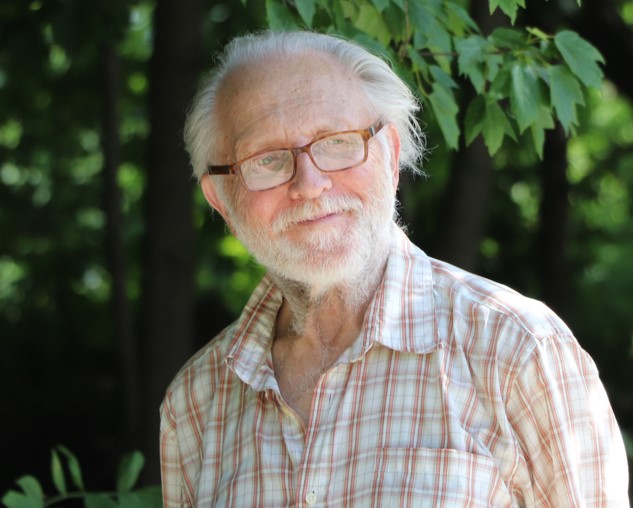
Encouraging the Retrieval of the True North: A Review of The Confederation Poets: The Founding of a Canadian Poetry, 1880 to the First World War
A Study by James Deahl (Hamilton, Ontario: Guernica Editions, 2022)
Review by Terry Barker
This collection of essays on the Confederation Poets by a Canadian poet of long standing surveys the work of the authors usually considered in Canadian Literature courses and textbooks under this rubric, but additionally presents and analyzes the writings of poets of the period probably unheard of by many well-informed readers. That this broader examination than is usually offered by books containing examples of “the canon” of Confederation Poetry is intentional is made clear by author Deahl’s “Introduction”, entitled “The Tory in Every Woodlot”, in which he indicates that his purpose in assembling these essays (which originally appeared in shorter form in the periodical Canadian Stories) as a book is to show that “The Red Tory climate of opinion upon which Canada was established can be experienced best by reading the Poets of Confederation”. Pointing out that the term “Red Tory” was “coined by [Canadian political scientist] Gad Horowitz and used by and about Canadian philosopher and political scientist George Grant during the 1960s”, Deahl clearly reveals that his analytical perspective in this book is philosophical and political, as well as, more obviously, literary. Indeed, the author clearly asserts that the category Red Tory “can be usefully employed to describe the cultural, social, religious, and political movements — in fact, the climate of opinion or Zeitgeist — that led to the creation and early development of Canada during the last four decades of the 19th Century.” Thus, The Confederation Poets is purporting to bring to current public attention, and to develop an understanding of, not simply an important phase of Canada’s literary history, but of Canada’s character itself, and also, less obviously than Grant did in his 1965 book Lament for a Nation, offer a critique of the ethos dominant in contemporary Canada, which is obviously not “Red Tory”.
Grant’s Lament for a Nation: The Defeat of Canadian Nationalism, arguing as it did that Canada had ended, in principle, around 1960, came as a bomb-shell to the country’s opinion-forming classes, preparing, as they were, for Centennial Year’s celebrations. In the final short chapter of the Lament, still largely ignored by commentators, Grant is crystal-clear in his rejection of all forms of historicism and progressivism (including both the liberal and Marxist varieties, as well as theological and philosophical manifestations of these thought-systems). He concludes his meditation with a passage from Classical poetry, which is meant, I believe, to convey the message of the book as a whole: “Whatever the difficulty of philosophy, the religious man has been told that process is not all. ‘Tendebantque manus ripae ulterioris amore’ (‘They were holding their arms outstretched in love toward the further shore.’) Virgil, Aeneid, Book VI”.
In his “Introduction” to the 1970 Carleton Library Edition of the Lament, Grant corrected what he thought had been a misapprehension concerning the meaning of the book caused by Canada’s ironic identity given the decline of the British Empire and the rise of the American world power in the twentieth century. As he put the interpretive problem:
“I emphasise this failure in irony because many simple people (particularly journalists and professors) took (my book) to be a lament for the passing of a British dream of Canada. It was rather a lament for the romanticism of the original dream.”
Rather surprisingly, Grant’s own insistence that his 1965 jeremiad was “for the romanticism of the original dream” of Canada was largely ignored.
In Deahl’s The Confederation Poets we have George Grant’s statement of the focus of Lament for a Nation — “the romanticism of the original dream” — addressed in an intelligent and scholarly manner; i.e., by the extensive presentation of the actual texts of the acknowledged poetic defenders of Confederation and their less-well-known colleagues, and their most important predecessor, the unofficial “poet laureate” of the United Province of Canada, Charles Sangster, the whole accompanied by Deahl’s commentary on the texts as illustrating “red toryism” (using this term as an analytical “tool” to order the “materials”, and show their relationship to the earlier romanticisms of Britain and the United States). This, of course, is the Aristotelian method in social science, preserved in the Scottish Enlightenment “Common Sense School”, which profoundly affected British, American, and Canadian thought in the nineteenth century, and which had an afterlife among revisionist (non-Marxist) socialists, but which in the Post-Modernist (or Heideggerian) present is more or less extinct.
Deahl’s qualifications experientially to undertake and carry out successfully such a coherent and realistic analysis are clear. Spending his formative years in Pittsburgh as an industrial worker and trade union and “New Left” activist around the American poetry scene, he emigrated to Canada in 1970, where he became associated with the budding “Left Nationalist” movement, making friends with prominent poets in this field, most notably Milton Acorn. In later years, Deahl taught Canadian Literature at the secondary and community college levels, and he has lectured at universities in Canada, the U.S., and England on aspects of the subject.
Most importantly, this book is a collection of “essays in retrieval”, in this case of the ethos of Canadian Confederation, quite apposite in the current climate of confusion abroad in this country. (Deahl started to write these pieces as a Sesquicentennial project during late 2016.) Such efforts at cultural anamnesis have always been necessary in Canada because of its perennial colonial status in the world.
His study of the ethos revealed in the writings of the Confederation Poets could be the jumping-off point for a reconsideration of current cultural and civilizational issues in Canada and the world, and for the retrieval of the meaning of such societal symbols as “the True North”, the latter image a prominent presence throughout the book. The probably controversial philosophical conclusions of the author concerning “what is to be done”, expressed throughout The Confederation Poets, serve to stimulate critical thinking, discussion, and further research in a reader. The Confederation Poets is thus a welcome addition to the resource-base available for those teaching non-specialist courses in Canadian and international affairs, and the book offers an interesting and eye-opening window on the Canadian past, and possible future.
Terry Barker holds an M.A. in Political Science from McMaster University. He taught Canadian Studies at Humber College, Toronto, including thirteen years to Chinese international students. He has published several collections of essays on the Canadian People’s Poetry tradition.


Published in Canadian Stories
Vol. 25, No. 145 (June/July 2022)
